Posts Tagged ‘World Relief Seattle’
World Relief Cup 2023
“When I walked into World Relief, I received way more than what I expected.”
—Bertrand
Celebrating World Refugee Month
Bertrand, a Career Pathways Coordinator, shared his experience at the World Relief Cup, as a participant who was resettled through our office.
“When I look back at my journey as a participant being resettled by World Relief, I am humbled and will forever be grateful for the opportunity for a fresh start…Today I am [able to be] World Relief to new famil[ies] walking through our doors. There are many great resettlement organizations out there but only a few do this work from a posture of servants and advocates.”
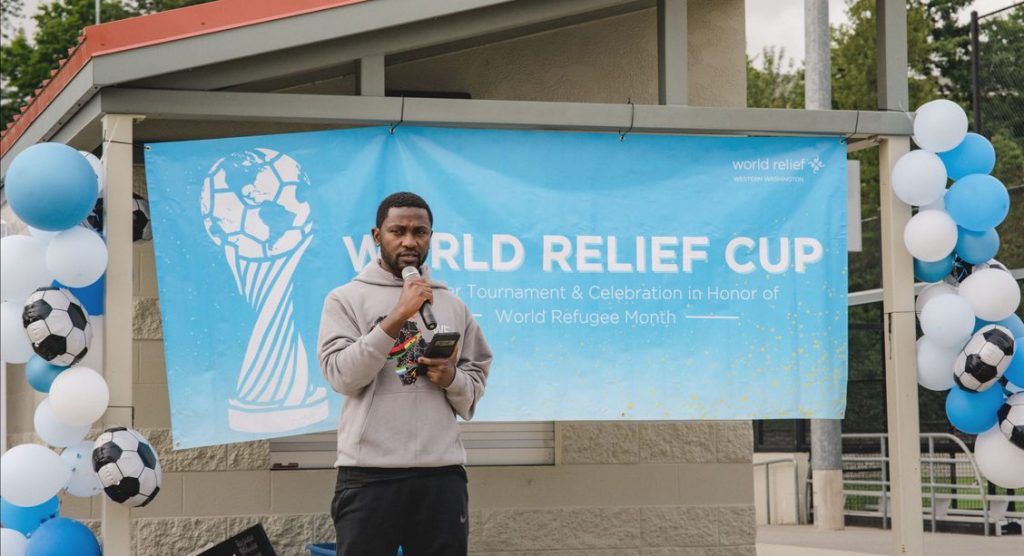
Bertrand shared his story as an asylee and being a recipient of the Match Grant program. He expressed his deep gratitude to the people who partnered with him from World Relief, like his case worker Jacob and the employment team.
As a staff member, he is proud to have the opportunity to now walk alongside participants on “the road to independence and a holistic self-sufficiency”.
We are so grateful to have individuals Bertrand on the World Relief team! Bringing his experience to his work, he is a part of creating lasting change for every refugee and immigrant.
More from the World Relief Cup
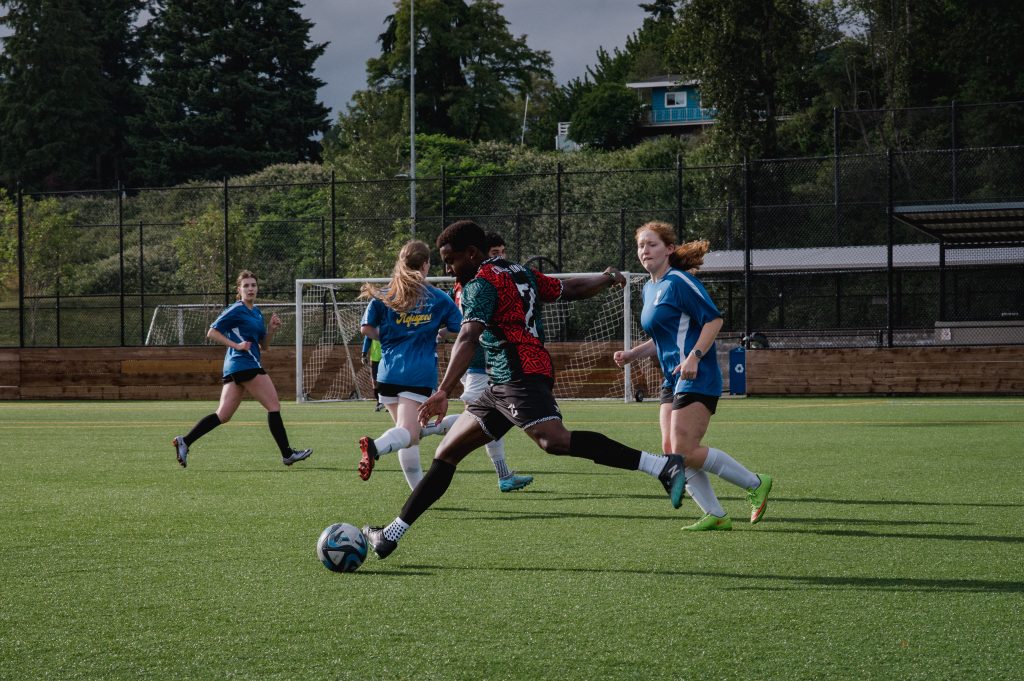
Through soccer, the Cup engaged the community in supporting refugees and immigrants. With the sponsorship and commitment of the community, we hosted a soccer tournament on June 10th to celebrate World Refugee Month! There were 11 teams with around 120 players who participated; including teams from local resettlement agencies, community leagues and our own World Relief Team.
While it was a drizzly morning, there was an amazing turnout! People came out in support of their friends, teams, and the work of resettlement through World Relief. Many people were engaged in conversation with members of our staff, getting to know our mission and vision. Many teams had players who have experienced resettlement as well as teams from other services organizations, like the International Rescue Committee.
People experienced World Relief through a unifying sport, having the chance to interact with others from across cultures and the community.
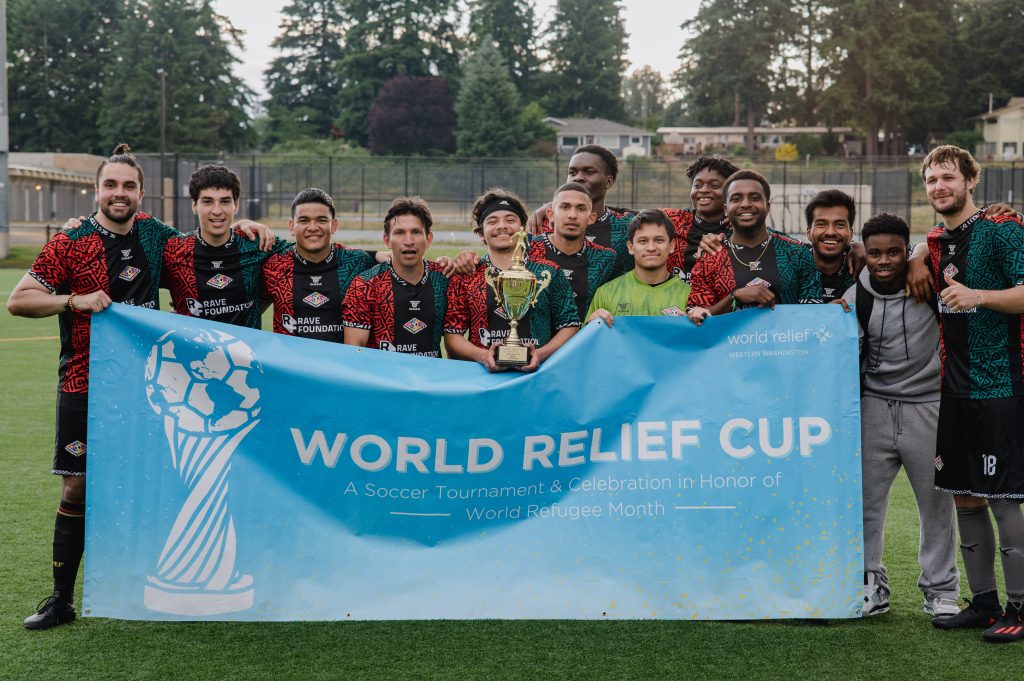
2023 World Relief Cup Champions
Congratulations to Cultures FC and their win!
2nd Place: Jake for a Cause | 3rd Place: Seattle Flounders
A Prayer for Refugees
On June 14, a ship carrying migrants bound for Europe capsized in the Mediterranean Sea. Despite search and rescue efforts, hundreds are feared dead.
Even as we celebrate the strength and resilience of refugees this World Refugee Day, we lament that, for so many people seeking safety and a more hopeful future in a new land, the route is often marked by unnecessary hardship and trauma.
At World Relief, we are mourning with those who have lost loved ones in this tragedy, and we pray that God would give us the courage to not look away.
Will you join us in praying for refugees and those seeking safety around the world?
Father, I still my heart and mind to focus on you. Speak, your child is listening.
(Pause in silence and prayer)
Read: “The Lord your God is supreme over all gods and over all powers. He is great and mighty, and he is to be obeyed. He does not show partiality, and he does not accept bribes. He makes sure that orphans and widows are treated fairly; he loves the foreigners who live with our people, and gives them food and clothes. So then, show love for those foreigners, because you were once foreigners in Egypt.” — Deuteronomy 10: 17-19 (GNT)
How wonderful and powerful you are, Lord. Help me to reflect you and love like you.
(Pause in silence and prayer)
Today, I pray for those who are vulnerable and who may not be able to see your might and presence in their lives at this moment. I pray for those fleeing violence, wars and persecution; be their guide and comfort. For the millions of refugees around the world, waiting for justice and a new home.
(Pause in silence and prayer)
I pray for my city and community. May it be a place of safety, support and solace for those in distress.
(Pause in silence and prayer)
Lord, I think about our nation’s leaders and government. May they use their positions of power to work towards justice and righteousness.
(Pause in silence and prayer)
I pray for your church, that it would be a city on a hill, shining bright as a beacon for all who seek a new and better way.
(Pause in silence and prayer)
Lastly, I stand firm, covered with the armor of God, and pray against the work of the enemy, who comes to kill, steal and destroy.
(Pause in silence and prayer)
I offer this prayer to you and declare that yours is the kingdom and the power and the glory forever. Amen.
The Drivers of Mass Displacement: Ukraine and Beyond
Nyakaar abandoned her home in South Sudan when armed conflict threatened her village. She found safety in the Bentiu Protection of Civilians camp, a U.N.-run camp for internally displaced South Sudanese people where World Relief operates health and nutrition programming. Shortly after arriving, Nyakaar gave birth to her son, Bone.
In the world today, a record-breaking 117.2 million people have been forced to flee their homes. That’s about 1 in every 78 people that live across the globe.*
While many of us think of refugees when we hear the words “mass displacement,” the majority of displaced people worldwide are actually internally displaced people like Nyakaar and Bone.
The causes of mass displacement are many, and the repercussions reach far and wide. Today, we’re taking a bird’s eye view of the topic of mass displacement to help you understand what causes people to leave their homes, who is fleeing and how people across the globe are joining World Relief to address the drivers of mass displacement and care for those who are displaced.
*These numbers reflect the latest estimates from the U.N. High Commissioner for Refugees. This blog was originally written May 10, 2022 and updated on April 11th, 2023.
What causes mass displacement?
People are displaced from their homes for myriad reasons — persecution, conflict, violence, human rights violations and climate-related factors to name a few.
The Russian invasion of Ukraine has been the most recent example of how war can force millions of people to flee their homes. However, there are many other conflicts and crises occurring in the world which are also causing people to flee their homes.
For example, violence in the Darfur region of Sudan has caused many to flee in search of a safe place to live, farm and raise their children. Some of these families remain internally displaced while others have fled across international borders into Chad and other surrounding countries. Apart from the unfolding crisis in Ukraine, 68% of the world’s refugees have come from the following five countries: Syria, Venezuela, Afghanistan, South Sudan and Myanmar. Though crises like these have received varying levels of media attention, the needs of the displaced remain critical.
Refugees, Asylum Seekers and IDPs
Many times, displaced people flee to regions or countries surrounding their home region, while a smaller percentage relocate to a more distant country. A displaced person can fall under several categories:
- Internally Displaced People
- Refugees
- Asylum Seekers
Internally Displaced People make up the largest category. These are people who have been displaced within their own country. They have been forced to flee their home and region, and have resettled in a different part of the same country in which they already lived. Currently, 61.2 million people are classed as Internally Displaced People.
Refugees make up the next largest group of displaced people. These are people who have fled war, violence, conflict or persecution and have crossed an international border to find safety in another country. It’s likely that you’ve read stories of refugees like Bohdan, Abdinasir and Amira — all people who left their home countries due to conflict or persecution, applied for refugee status and were resettled right here in the United States.
Today, there are about 29.3 million people with refugee status in the world.
In 2022, the U.S. has agreed to resettle up to 125,000 refugees plus an additional 100,000 Ukrainians who have fled the Russian invasion. As is evident, there are far more refugees in the world than can be resettled even in a country as large and as resourced as the U.S.
Asylum seekers make up the third and smallest category of displaced people. These are people who have fled to another country, but who have not yet been granted official refugee status. These women, men and children may have to wait years to receive an official status.
Currently, there are about 5.6 million asylum seekers living around the world today.
Host Communities
One final impacted group remains to be identified, and these are the host communities.
Host communities have not been displaced from their homes, but the swift influx of refugees into their communities severely impacts those who already lived in the region. Often host community members need the same support that refugees, asylum seekers and internally displaced people typically receive.
A large number of refugees can mean reduced access to land and water and can cause a scarcity in resources. For example, in Sudan, conflicts have broken out over land usage, as host communities and displaced people seek to utilize the scarce land and water resources available in the host community area.
World Relief works within these communities to increase access to clean water as well as facilitate peace committees to solve interpersonal conflicts before they grow.
What else is World Relief doing to help?
After a person is displaced, they can either choose to return to their home, or they can resettle in a new location. However, for many, the option to return home is not a viable one, as drivers of displacement often last for generations. World Relief is currently serving displaced people across the globe in several ways:
- In DR Congo, a country that’s facing one of the world’s worst hunger crises, World Relief works with host communities and with displaced people who have returned home by providing agricultural training and farming supplies to help families grow crops to feed their families and sell the surplus in local markets to earn an income.
- Globally, World Relief serves refugees who have crossed the border into our international countries of operation, working with local partners to provide emergency aid to families living in temporary shelters.
- In the U.S., World Relief partners with the U.S. government to resettle refugees. We also serve asylum seekers and other immigrants by providing community connections, legal services and other vital services like ESL classes, job training and more.
- In Sudan, South Sudan and DRC, World Relief serves internally displaced people by equipping local village peace committees and providing health, nutrition, WASH, education, agricultural programming and more.
- World Relief also advocates for the vulnerable when injustice occurs. We believe speaking up along with the poor and oppressed is an important witness to a watching world about the character of Jesus.
Mass displacement remains one of the largest and most challenging crises of our time — a truth that will take intentional coordination and investment between local and international communities, churches, governments and non-profit organizations to address.
At World Relief, we believe Jesus came to earth to love the vulnerable. Jesus didn’t bring hope and salvation from a distance. Instead, he came to us, showed us love and suffered with us. Whether we are welcoming refugees and asylum seekers into our own communities or providing relief to those displaced overseas, we get to be the hands of feet of Jesus, sharing his love to a world in need.
To learn more about how you can help refugees and displaced people in the U.S., visit our private sponsorship page.

Lydia Dawson served as World Relief’s Humanitarian and Disaster Response Unit Program Officer in Sudan, and in disaster response worldwide. Prior to joining World Relief, Lydia worked in homeless services and community development in Oregon and California. She is passionate about equity and honor for underrepresented groups, both locally and internationally.
“When You Cook, You Have To Cook From Your Heart”
OPENING THE COMMERCIAL TEACHING KITCHEN IN KING COUNTY
Several years ago, World Relief Western Washington (WRWW) hosted a listening session where the local refugee-immigrant community could gather and openly share their needs, struggles, and hopes. What resulted was a dream we decided to help make a reality. With the support of funding from King Conservation District, The WA Commerce Department, the U.S. Small Business Administration, private donors, and generous architects and construction crews, we constructed a commercial teaching kitchen. Soon the 1,215 sq. ft. commercial teaching kitchen will be complete and open for programming including cooking and nutrition workshops and a food industry career pathway course!
Cooking is important to us. We learned this as we listened to the community. Through food we build community, sharing in each other’s joys and sorrows, and inspiring dreams as we nourish our bodies. Listen long enough to the stories of the people around you, and you will see this too.
“When you cook, you have to cook from your heart.”
—Cooking advice shared by a recent arrival from Afghanistan who loves experimenting with traditional recipes and cooking for his friends and family.
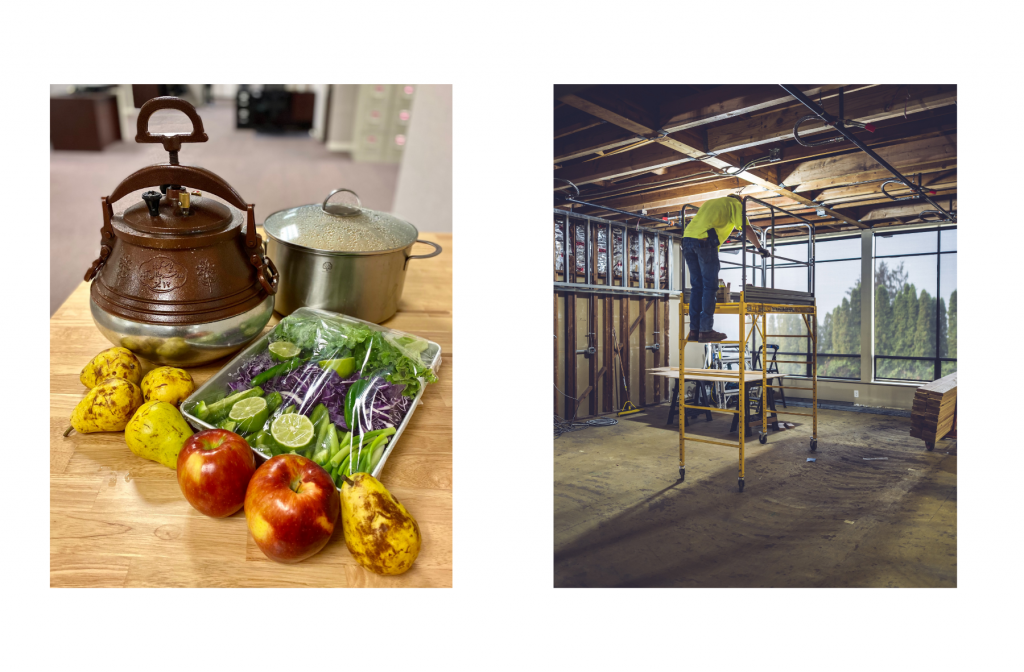
A KITCHEN TO GATHER PEOPLE
“I love to bring joy to people with my baking,” says Katya, a new arrival from Ukraine. “You become a part of people’s special events [when you bake food for them]. You become a part of the joy.” Katya owned a catering business back in Ukraine. Here in the US, she has found joy in preparing baked goods from recipes passed down from her grandmother. Her baked goods tell a story of her family and her homeland of Ukraine. Katya dreams of one day opening a bakery here in the US so more people can share her joy.
We are excited for Katya to be one of our featured guest chefs this summer in a series of cooking workshops hosted by WRWW. Through refugee and immigrant-led cooking classes, community members will have the opportunity to gather, learn from our new neighbors, and celebrate the diversity of our community. Through food we can appreciate the many cultures that shape our growing community.
Our food tells a story about where we are from and who we are now.
A KITCHEN TO BRING NOURISHMENT
Pausing to prepare food and eat reminds us of our human need. Our need for food is not undignified in its existence, but a sacred reminder of our humanity and our beautiful calling to nourish mind, body, and soul daily.
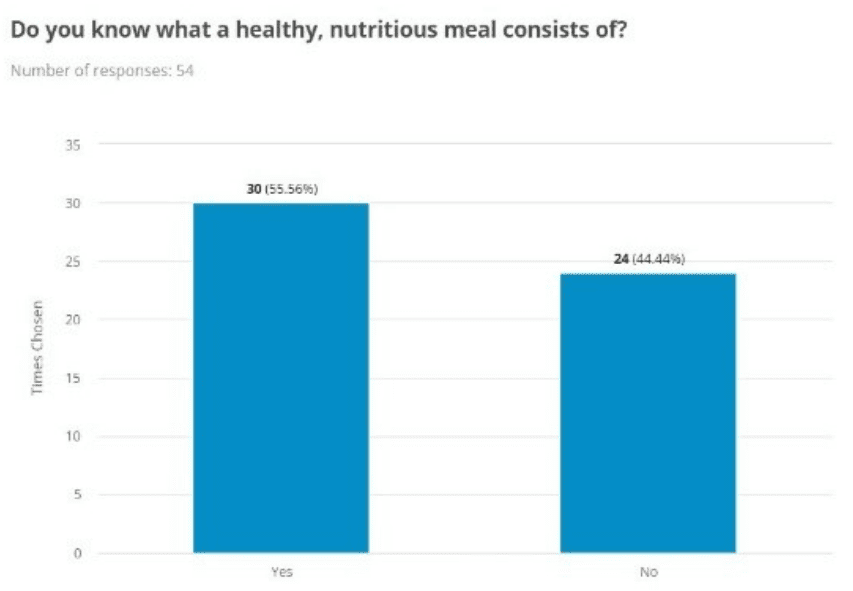
How we respond to our needs matters. The food we eat matters.
According to a May 2023 survey conducted by WRWW, a high percentage (approx. 44%) of refugee & immigrant respondents indicated that they do not know what a healthy, nutritious meal consists of.
The WRWW Commercial Teaching Kitchen will offer nutrition classes and healthy cooking workshops, equipping refugees and immigrants with the knowledge and skills they need to prepare nourishing food for themselves and their families.
Healthy food brings our bodies strength, healing and vitality.
A KITCHEN TO INSPIRE DREAMS
Refugees and immigrants arriving in Washington have left much behind. But they also bring so much with them. They bring pieces of their culture, creativity, ambition, skills and dreams. They come with so much to offer to our community.
World Relief Western Washington believes in the inherent resiliency of refugees and immigrants and is committed to coming alongside the refugee-immigrant community to equip them to thrive in their new home. Developing cooking skills and building knowledge and connections within the food industry provides refugees and immigrants with more opportunities for employment and creative economic endeavors. Programming won’t only focus on the culinary arts or business pathways. Workshops will be designed in such a way as to draw out creativity, instill confidence, and inspire dreams both new and old.
With the completion of the WRWW Commercial Teaching Kitchen we celebrate the realization of one dream and look forward to the start of many more!
Systems Change in Seattle
As World Relief Seattle’s Executive Director and an immigrant myself, I have seen the razor-thin line between security and insecurity that many immigrants experience. Never was this more clear to me than this year, as our office rallied to serve those hardest hit by the COVID-19 pandemic.
As the pandemic wore on last year, we received many calls for help from our community — for help with navigating unemployment, for help finding work, for help with rent assistance and for help with the food insecurity many were facing.
World Relief Seattle’s Resiliency Programs Manager, Tahmina Martelly, jumped into action, along with Santa Pradhan, our Employment Manager. Both of them being women of color and women who have faced the refugee journey, they were hearing the need both at work and at home in their communities.
Without delay, the Employment Team united to help over 98 folks access unemployment benefits and many others get re-employed. The Resiliency team addressed the food insecurity issue in partnership with Hillside Church, where our Community Garden is located. Tahmina began to put the word out and people from all across the community began to show up with food. We formed a formal partnership with Northwest Harvest and began a weekly food distribution site— serving more than 800 families a week with food boxes that lasted 3-5 days.
One day, I went to check out the operations, first-hand. And it struck me that most of the folks in the cars were from our black, brown and immigrant communities. After 30 years of working in marginalized communities, I realized that they were the very same people that were in these lines whenever crisis hits. It disturbed me so much that I returned to my car crying and wondering how we could change the system, so that the next time a crisis hits, our communities could go to the store and buy their own food, not wait in lines at distribution sites.
As a Leadership Team, we decided that to change the system we needed to invest in two powerful and proven strategies to move people out of poverty— economic and educational empowerment. So this year, we’re planning to launch several “system change initiatives”. They will include a commercial/teaching kitchen, an Immigrant Entrepreneurship Academy for emerging businesses and support services for existing immigrant businesses. We are also going to continue investing in immigrant and refugee youth — making sure the curriculum in our Summer Academy is academically rigorous, provides academic support and prepares them for a bright future.
We might not be able to change the whole world, but this International Women’s Day and for Women’s History Month, the amazing women on our team, and I, hope to make a positive change in our small piece of the world!

Chitra Hanstad began as Executive Director at World Relief Seattle in January 2017. Prior to this, she spent time in India consulting for Justice Ventures International (an anti-trafficking organization) on strategic planning and fund development and as a Philanthropic Advisor for the Seattle Foundation. While her career started in corporate advertising, public relations and media relations, she has spent most of the last twenty years working for local and international non-profits. Chitra has a passion for seeing at-risk communities thrive. She has served on many boards including Covenant World Relief & Urban Impact, and volunteers with The Stability Network.






